As promised, here is the original draft of the story that became “Wolves Among Stones at Dusk,” cussin’ and all. Certain names have been redacted to protect certain contests that are ongoing.
“Wolves and Stones”
Atop the low mesa, in the scorched-orange glow of the setting Arizona sun, a Mexican Gray Wolf paced in frustration. Few humans have ever seen a member of this rarest of North American species of wolves, fewer still have ever heard one growl, and fewer than that could claim to have heard the gurgle of hunger pangs coming from the stomach of such a creature. The man seated on the edge of the mesa’s cliff, a few feet away from the wolf, might have been able to accomplish all three of these rare feats, had he only been paying attention.
The wolf eyed the old man silhouetted against the sun. Even squinting against the light, the wolf could see the long and stringy gray fur of his quarry as it fluttered behind his head in the breeze of dusk. Similarly caught in the breeze were the strings and ribbons of the torn fabric that still adorned the man’s body. Dozens of growing shadows also stretched out from the many paw prints the wolf and his pack brothers had left in the dust of the rock shelf over the past months.
The senses of wolves are fine-tuned receptors of many levels of information broadcast by their prey. They can tell, for instance, when an animal is wounded by the rhythm of its breathing. They can savor the delicious smell of fear and know from it precisely when their prey is about to bolt. The old man, however, gave off little information, which was frustrating, for the wolf. He may as well have been concentrating his senses on a blank patch of air for all the good it did to turn them on the old man’s body. The man’s smoky blue eyes—which were on some days closed, but more often, as they were now, merely narrowed—remained focused on some place in the far distance, motionless and with no indication of internal activity. The only emotion any of his pack brothers had ever been able to sense from the old man was an occasional flicker of deepest regret. And, as this was an emotion alien to wolves of any species, neither he nor his brothers we able to recognize it as significant. The man appeared much as other gray-furred humans did when they neared the end of their lives. However, there was something about him that made the wolf certain this human was far older than he appeared. The wolf could smell the old man’s blood—even beneath the layers of grit that coated his pale skin, but its flow was almost imperceptible. The wolf listened. After nearly a minute, he heard the beat of the man’s heart, the stir of his blood, and then silence once more. Instinctively, the wolf knew this was wrong, for animals and humans were creatures of blood, even those foolish enough to stray into this place of heat and dust. Blood was their essence and their life—both of which were the wolves’ right to take as they pleased, or as they dared. A creature whose life did not flow even as fast as that of the hated greenshells was not a natural creature. However, as the wolf had long ago reasoned, it was still blood. This old man—whose blood refused to flow properly, whose skin refused to rend beneath fang, whose bones refused to break when, in impotent rage, he and his pack brothers had toppled the man’s body from the edge of the cliff—was a continuing puzzle in the wolf’s mind. His pack brothers had all but given up, but the puzzle was what brought the wolf back to this mesa nearly every day. His own chipped teeth served as an ever-present reminder that this stone-like man had not yet been caught, despite the fact that he had also never fled.
Padding two steps closer across the still scorching surface of the dusty mesa, the wolf allowed himself a whine of irritation. His impulse was to rush at the man, to bound off of the muscles of his back and send his body over the edge again. At barely seven cactuses in height it was not a long fall to the desert floor. To investigate the fallen form, though, would have required a journey back along the mesa, to where the treacherously steep and rocky terrain gave way to a more easily traversable slope down to the desert floor. Despite making that same journey many times, he knew that it would be a fruitless waste of previous energy. And, as always, he would only find the old man at the foot of the mesa, his body still bent in its seated position, unharmed save for fresh rips in the fabric covering his body. And there the old man might remain undisturbed for days, or even weeks until it would one day be found seated again on the edge of the mesa’s cliff, eyes staring into the distance, face timeworn like that of the mesa itself. None of the wolf’s pack brothers had ever observed the man making the return journey to his perch, nor had any of them ever seen an indication of movement from him. But clearly he did move when it suited him to do so. Fungus, one of his pack brothers, claimed to have once seen an old woman on the mesa as well. He claimed she had emerged from a wooden cave in the air and had carried a shiny stick. She had screamed noises at the old man for some time, but even then he did not move and the old woman returned to her wooden cave in the air and closed its door. None of the other pack brothers had witnessed this, none of them had seen the wooden cave, and none of them would admit that they did not know what a wooden cave looked like let alone how it came to be in the air. Fungus was crazy.
The wolf remained seated a few tail lengths distance from the old man and waited as the evening slowly grew darker. Prey of a more animated nature would be stirring before long and the wolf knew that his hunger would soon be sated.
In the distance, across the dry lake bed overlooked by the mesa, there came a humming, growling sound. Within a short time, two lights appeared to accompany the sound and the wolf knew that this signaled the approach of one of the long, armored, round-legged beasts that had been tamed by the humans. The wolf had seen such beasts before, but their territory was usually limited to the long gray stretches of flat rock the humans had arranged on the far side of the lakebed. On occasion, however, the humans and their beasts had strayed into his pack’s territory. The wolf knew that he must be on his guard for moving humans were less predictable than the still old man.
As the long beast came closer, the wolf could see that it was black and with two fins at its rear, much like the creatures he had seen rushing through the distant rivers in the rainy season. It stopped moving some distance from the foot of the mesa, perhaps not wishing to venture close to some of the larger rocks that had fallen from its face. The beast stopped growling, but light continued to pour from its eyes. Presently the black armored sides of the beast opened, causing a low buzzing sound that only ceased when the humans had emerged from the beast and again closed its sides. The wolf could at once smell their sweat and then their blood. It was pumping just fine. Then the humans began to make their usual noises.
“You have got to get a new ride, man!” one of them said, striking the side of the beast with his foot. The wolf observed that the man’s lanky form might lend itself to swiftness.
“I said I was sorry,” the other one bellowed. He was taller and stouter than the lanky man. The wolf didn’t understand him either, but thought the big man could prove to be a powerful, but slow opponent.
“No A/C, broken window crank… It’s like an oven in there! Probably cooler in the damn trunk.”
“If I’d known we were coming all the way out here, I would’ve borrowed a different car,” the bigger man said. “Maybe Donny’s new one.”
“That hatchback piece of shit? What an asshole!”
“Hey, he got a great deal on it.”
“I don’t care if he got it for free,” the lanky man said. “It’s still a hatchback piece of Japanese shit and Donny’s an asshole for buying it.”
The wolf felt a flash of anger from the big man, but it quickly subsided. “Don’t worry about it,” he said. “It’ll get plenty cool here once it’s all the way night. We could probably just leave him and go. He’d be froze by morning.”
“We’ll leave him, all right,” the lanky man said. The man then reached into his clothing and produced a small white stick. His paw then seemed to catch fire and he touched the tip of the stick into the flames until smoke began to puff from his mouth.
“Let’s do this,” the lanky man said.
From his perch on the mesa, the wolf watched as the two men walked to the rear of their beast to open what must have been its armored, flat tail.
“Oh, look. He’s awake,” the lanky man said. “Get him out of there.”
The bigger man reached into the rear of the beast and, with some effort, withdrew from it another human. For a moment, the wolf entertained the notion that the humans were born from their armored beasts. But then he became distracted by the new sensory combination of sweat, blood and, most deliciously, fear, as the newly born man was dropped to the ground. It took a moment to see the new man clearly, but his top legs appeared to be bound behind his back and his lower legs bound at the ankle. The bound man smelled younger than the first two men, scarcely older than a pup, but he wasn’t a small man either. Another growl of hunger escaped from the stomach of the wolf and he padded closer to the edge of the cliff, watching as the big man looped his paws into the pits of the bound man’s top legs and pulled him along the desert floor and into the light of the beast’s eyes. The lanky man followed and propped one of his leather-covered lower paws onto the beast’s lip.
“Hiya, (NAME REDACTED),” the lanky man said, puffing out his smoke. “Welcome to the desert.”
The bound man made noises, but his jaws were covered by something.
“What’s that? You don’t like it out here?” the lanky man said. He laughed. “Aww. Ain’t that sad, Mike? (NAME REDACTED) comes out all the way out from the East Coast and he doesn’t want to see the sights.”
The big man gave a chuckle. “Yeah, it’s a… it’s a real shame.”
The lanky man leaned down over the prone, bound man and began making louder sounds. “It is a shame. Cause if (NAME REDACTED) didn’t want to see the desert, all he had to do was stay home in the first place. Right, (NAME REDACTED)?”
The bound man made an aggressive sound from beneath his mouth covering. The lanky man flashed with anger and struck out with one of his lower paws, connecting with the bound man’s midsection. This elicited a muffled groan of pain.
“No, if he’d just stayed home and played in his own sandbox, we wouldn’t have had any reason to give him a ride to ours.”
The bound man made more muffled noises.
“Oh, look there, Mike! I think (NAME REDACTED)’s starting to see the light.”
The big man laughed, but he smelled nervous.
“What is it they say about hindsight, Mike?”
“Um,” the big man said. There was a long pause. “It’s good to have?”
“That’s right,” the lanky man said. “It’s good to have.” He then reached one of his paws into the back of his leg-coverings and returned with something heavy and black. “Trouble is, it’s only useful to have it if you’re still around to learn a lesson from it afterward.”
The bound man instantly began making louder, more frantic sounds. His heart was racing. Fear was pouring out of him, causing the wolf’s mouth to water. He wished his pack brothers were near. Together, they might have a chance of catching at least two of these men before any of them could hide in the guts of their armored beast. After frustrated months of wondering what an easy human meal might taste like, this opportunity was tantalizing.
“Sorry, (NAME REDACTED),” the lanky man said over the cries of the bound man. “Some mistakes you only get to make once. If it’s worth anything to you, though, we’ll be sure to send (OTHER NAME REDACTED) a condolence card for you.”
The bound man’s body thrashed, striking out with one of his back legs, which had apparently come free of its binding. The lanky man dodged out of the way, scarcely avoiding the strike and the bound man’s foot connected with the lip of the beast instead with a thunk. The armored beast did not cry out.
“I told you to tie him good!” the lanky man screamed, his fire stick falling from his mouth.
“I did!” the big man shouted. Anger. Nerves. Fear.
The wolf now stood at the very edge of the cliff. He could see the bound man still thrashing on the ground, rolling partially out of the beast’s eye lights. If it were half an hour later, he would have rolled into pitch blackness, but in the twilight he could still be seen even by the humans. The wolf could smell the sweat and dirt that now caked the man’s face, could practically see the blood roiling beneath the thin skin of his neck. He longed to sink his teeth into that neck. Without his pack, though, he did not dare move. For now, he would simply stay upon the mesa, next to the stone-like old man, and watch.
The lanky man shouted below and waved his heavy black thing some more until the big man seemed to find his motion. He stepped around the edge of the armored beast, leaned over and struck out with a clenched paw. The motion wasn’t precisely quick, but it was powerful enough to still the movements of the bound man. The wolf could smell urine almost immediately, but the bound man’s heart was still beating strong.
“Where’s the rope?” the big man said.
“Fuck the rope. Just do him.”
The big man looked down at the bound man. “W-what?” he said.
The lanky man bore his teeth. The wolf could smell firestick smoke and onions on his breath—pathetic plant-eaters. “We didn’t drag him out here to play dress up, Mike. Do him.”
“But I… I don’t want—” the big man said. The wolf could feel the pulsing of his nerves.
“You’re doing this,” the lanky man said. “If you want to keep working for Lance, you’re going to have to prove yourself useful. He knows you’re good for fist work, but he says you ain’t got the stones for nothing else. I’m the one that set him straight about that. Got it?” The lanky man turned the heavy black thing over in his paw and held it out to the big man. “Do it.”
That was when a rock fell from the upper face of the mesa. It fell five cactus heights before impacting noisily against the slight slope of the otherwise almost vertical face of the mesa. The wolf didn’t know if his own weight had caused it to fall, but he could see that it had drawn the attention of the men on the desert floor. They had turned toward the sound and were holding their paws up to block the glare from the armored beast. While the sun had already set, the wolf knew there was possibly still enough light for even the humans to make out his shape and that of the old man. The wolf stood his ground.
“Something’s up there,” the lanky man said after a time.
The lanky man moved to the rear of the armored beast and reached inside its still open rectum. He brought out another stick, the end of which burst into light, and turned its beam in the direction of the mesa until it found its target, shining directly onto the old man’s glass-eyed staring face.
“It’s a dude,” the big man said.
The wolf drew away from the beam, but his movement must have been noticed, for the light quickly flicked into his eyes.
“It’s a dude and his dog,” the lanky man said. “Probably some Indian off the reservation, or something. Probably drunk.”
“But he might have seen us,” the big man said.
“Yeah. No shit.”
The light flicked back onto the old man’s face and remained there as the lanky man walked forward toward the cliff face.
“Hey! Hey, mister? Nice night for a walk, huh?” the lanky man said, bringing the heavy black thing up just behind his light stick. “We’re just out here, playing a trick on this friend of ours. You want to come down and see?” The lanky man paused for a moment, watching.
“He ain’t moving, Tito,” the big man said. “You sure he ain’t dead?”
“He’s got a dog,” the lanky man said, moving again toward the face of the mesa. Then he tripped over one of the many loose stones in plentiful supply near the foot of the mesa and stumbled forward, flailing his top legs to keep his balance. His light flickered down for a moment to check his footing, but returned quickly to the wolf’s face and then the old man’s.
“Got some primo whiskey in the car, man. Firewater?”
“What are you doing?” the big man said from where he remained near their beast. The lanky man stopped moving and seethed, but didn’t shift the light from the old man’s face.
“I’m just coming over to invite our new buddy up there to play a little game with us.”
“A game?”
“Yeah,” the lanky man said. “That’s right, Buddy. Play a game with us. Your doggie can play, too.” The lanky man again raised the heavy black thing behind his light. “I like to call this game, `Target Practice,’” he said.
The black thing spat out three bursts of fire that were louder than thunderclaps. The wolf dropped into a startled crouch, but had already felt the vibrations as two of the fire bursts struck the face of the mesa below, sending more rock raining down. The third struck the old man’s knee, rocking him on his perch, but doing no damage. Even the cloth covering of the man’s legs was untouched, for it had been torn away during the old man’s many tumbles from the rock at the hands of his pack brothers.
Carefully, the wolf raised his head to see over the cliff. The lanky man was covering his face with one of his top legs against the shower of rock chips. Then his light shone again across the old man’s unchanged face.
“Did I hit him?”
“I… I dunno,” the big man said. The wolf could smell the big man’s fear nearly as strongly as that of the bound man before. And beyond the edge of the armored beast, the wolf could hear a low moaning from where the bound man lay.
The lanky man lifted the heavy black thing and it spat another burst of fire and noise. This time the thunder burst struck the old man on the chin and flew off into the sky.
“He moved! I saw him move!” the big man called. Indeed, the wolf saw that the old man had been rocked back from the force of the burst, balanced momentarily on the pivot of his rear. Then he fell forward again into his seated position. Other than a small spot where the fire blast had chipped away some of the crust of sand and dust on the old man’s chin, though, there was no sign that he’d been struck at all.
“Goddammit!” the lanky man shouted. “How am I missing? He’s only like 50 feet away!”
“I seen him move,” the big man called again.
“He ought to be running,” the lanky man said. “This old fuck’s either dead drunk or dead stupid.”
The wolf peered over the edge of the cliff, but was hit by the beam of light and jerked his head back. Another thunder burst sounded, sending up a blast of rocks from the edge of the cliff where the wolf’s head had been moments before. Then another burst followed, this one bouncing off the old man’s shoulder, spinning his body around slightly until his bent knees caught on the edge of the cliff.
“Son of a bitch!” the lanky man screamed. The light beam danced frantically across the old man’s front. There then followed a loud click and an angry cry from the lanky man. “Shit!”
The light vanished. The wolf couldn’t see what was happening below, but from the sound of it he didn’t need to see. He could hear the lanky man’s pawsteps as he moved back down the slope of the foot of the mesa.
“Bring me the bullets from the map box!” the lanky man screamed. Even as he was making this noise, though, the wolf could hear the sound of rocks sliding beneath the man’s back paws. The lanky man’s heart rate increased as he flailed his top legs to compensate. More stones could be heard sliding as the man scrambled through them, and then there came a shout that ended abruptly as the lanky man’s body struck the rocky slope. Instantly, the wolf could smell the tangy scent of blood in the air, just as he felt the sharp increase of the man’s body systems reacting to pain. The wolf’s mouth watered anew and he stepped back to the edge of the cliff. Now he could see the lanky man below, lying awkwardly on his back amid the rocks. The light stick had tumbled further down the hill, as had the heavy black thunder-spitter.
“Tito? Are you okay?” the big man called from near the armored beast.
“My leg… my back… my goddamn leg!” the man moaned between gasps for air. He tried to bend to reach for his shin—which the wolf could smell as the source of the blood—but the lanky man was scarcely able to raise his own head. The big man ran toward his fallen friend, but he too tripped on a rock and went flailing through the darkness before regaining his balance. He reached the light stick and used its beam to guide him to where the lanky man lay. There followed a long time during which the lanky man screamed a number of times in anger as well as a number of times in agony as the big man attempted to help him to his paws. They were so engaged in this that neither of them noticed that the bound man had risen to stand upright beyond the armored beast. Just as the big man was at last able to raise the still howling lanky man to a standing position, the now unbound man pulled open the side of the armored beast, causing the buzzing to return as he climbed into its guts.
“What the hell?” the lanky man shouted.
The beast roared to life, causing its eye lights to blaze even brighter.
“Get him! Stop him!”
The big man stood still, supporting the lanky man’s weight.
“He’s taking the fucking car!” the lanky man screamed. “Get him!”
“The gun! Where’s the gun?!” the big man said.
“Go! Get him! Just fucking get him! Go! Go!”
The big man let go of the lanky man, who crumbled into a screaming pile. The wolf then saw the light stick beam darting along the ground as the big man ran through the rocks as best he could toward the armored beast. It was too late, though. The unbound man had guided the armored beast to move backward and then to turn its round legs toward the lake bed. It then leapt forward, bounding smoothly back in the direction of the human’s usual territory—where their hard, gray stretches of land extended from horizon to horizon. The big man ran after it, but, just as the wolf had suspected earlier, he wasn’t very fast at all. The light still clutched in his paw, swinging as he moved, the big man continued to run after the armored beast long after the red fin lights and the white light of its still open rectum had vanished. Then the big man tripped and the light stick dropped and went out.
From his perch on the top of the mesa, the wolf threw back his head and howled. A moment later, he felt glory at the mixture of pain and terror that exploded from the desert floor below. In the distance, he heard a return cry and he bounded away to greet his pack brothers and lead them to what might only be their first kill of the night.
Seated on the edge of the cliff, his body cocked at a slightly acute angle, the old man remained, his expressionless, stone-like face staring into the cold desert night.
THE END
Copyright 2010-2015 Eric Fritzius, Mister Herman’s Publishing Company. All rights reserved.
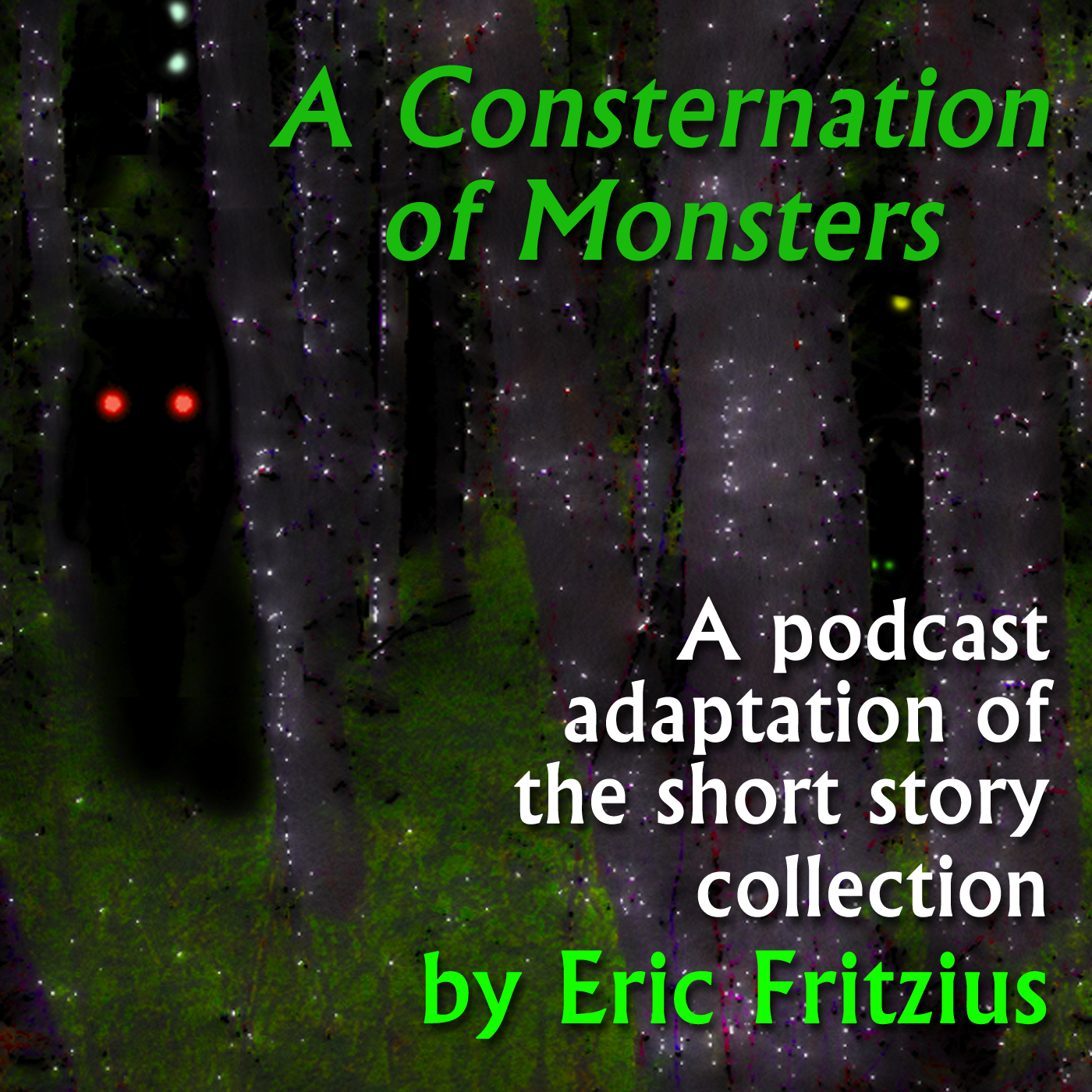 A few long time friends and/or followers of this page might have noticed a couple of changes to this site over the years. I’m not just talking about the semi-once-a-decade sprucing up I do on the visuals (it is a nigh on 25 year old site, after all), or the shifting sands of content; no, I’m talking about the name of the site itself. Oh, it’s always been called Mister Herman’s Home Page–or, at least, phonetically it has–but the actual URL address has danced about when it comes to spelling.
A few long time friends and/or followers of this page might have noticed a couple of changes to this site over the years. I’m not just talking about the semi-once-a-decade sprucing up I do on the visuals (it is a nigh on 25 year old site, after all), or the shifting sands of content; no, I’m talking about the name of the site itself. Oh, it’s always been called Mister Herman’s Home Page–or, at least, phonetically it has–but the actual URL address has danced about when it comes to spelling. 
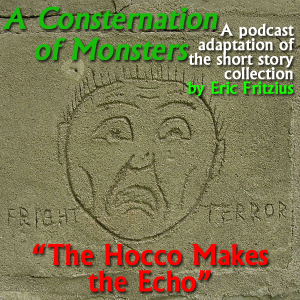
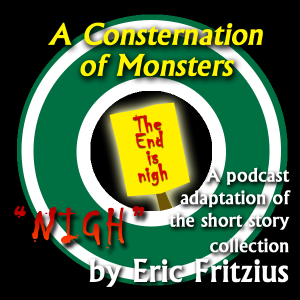 for millennia. It is always on the horizon, but so far has not come to pass. Mr. Daniels, however, has his own prediction and, unless he’s wrong, the danger of the end of the world is very real indeed.
for millennia. It is always on the horizon, but so far has not come to pass. Mr. Daniels, however, has his own prediction and, unless he’s wrong, the danger of the end of the world is very real indeed.

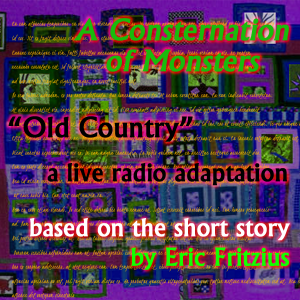


 t. Twenty-five people dead. The worst accident in Alaska’s tourism history since Will Rogers’ plane went down in ‘35. Only one man left alive knows the truth of what really happened — the man everyone agrees caused the tragedy to start with. And if there’s one thing he’s sure of, the thing they hit that day was no whale.
t. Twenty-five people dead. The worst accident in Alaska’s tourism history since Will Rogers’ plane went down in ‘35. Only one man left alive knows the truth of what really happened — the man everyone agrees caused the tragedy to start with. And if there’s one thing he’s sure of, the thing they hit that day was no whale.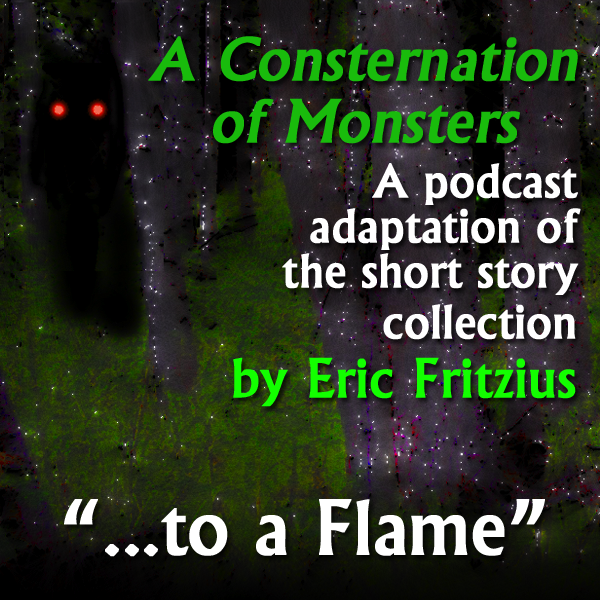

 I just finished recording the audio version of my short story “The Wise Ones,” from A Consternation of Monsters. Unlike most of my audio efforts, this was a particularly annoying recording session because my stomach refused to stop gurgling throughout it.
I just finished recording the audio version of my short story “The Wise Ones,” from A Consternation of Monsters. Unlike most of my audio efforts, this was a particularly annoying recording session because my stomach refused to stop gurgling throughout it.









